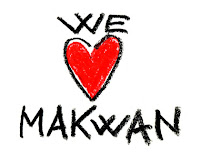In August, 2006, seven young, black, queer women from Newark were hanging out together, late at night, in the West Village. Several of them had known Sakia Gunn and/or gone to high school with her. One of them (Johnson) was carrying a small steak knife in her purse. She would later say that she kept the knife there for self-defense, because she sometimes felt unsafe on the street.
Here's a summary of the facts of August 18, 2006 from the fabulous Imani Henry in Worker's World:
As they passed the Independent Film Cinema [on 6th Avenue at W. 3rd Street], 29-year-old Dwayne Buckle, an African-American vendor selling DVDs, sexually propositioned one of the women. They rebuffed his advances and kept walking.
“I’ll f— you straight, sweetheart!” Buckle shouted. A video camera from a nearby store shows the women walking away. He followed them, all the while hurling anti-lesbian slurs, grabbing his genitals and making explicitly obscene remarks. The women finally stopped and confronted him. A heated argument ensued. Buckle spat in the face of one of the women and threw his lit cigarette at them, escalating the verbal attack into a physical one.
Buckle is seen on the video grabbing and pulling out large patches of hair from one of the young women. When Buckle ended up on top of one of the women, choking her, Johnson pulled a small steak knife out of her purse. She aimed for his arm to stop him from killing her friend.
The video captures two men finally running over to help the women and beating Buckle. At some point he was stabbed in the abdomen. The women were already walking away across the street by the time the police arrived.
Buckle was hospitalized for five days after surgery for a lacerated liver and stomach. When asked at the hospital, he responded at least twice that men had attacked him. [He then changed his story and began telling the media that he was the victim of a "hate crime" perpetrated by "a ton of lesbians".]
There was no evidence that Johnson’s kitchen knife was the weapon that penetrated his abdomen, nor was there any blood visible on it. In fact, there was never any forensics testing done on her knife. On the night they were arrested, the police told the women that [they would search for the two intervening men]—which to date has not happened.
The women thought they had successfully fought off an attack before it turned seriously violent; they were decompressing in the McDonald's a block away when NYPD officers arrived and arrested them as the alleged seriously-violent attackers.Three of the women plea-bargained, agreeing to serve six-month jail terms for "attempted assault." They're already out. Thus, previous messaging about supporting the "Jersey 7" has morphed into advocacy for the "Jersey 4."
The 4 stood trial together in the spring of 2007. The judge, Edward J. McLaughlin, was a white man, a former prosecutor. Imani Henry's summary of the trial:
According to court observers, McLaughlin stated throughout the trial that he had no sympathy for these women. The jury, although they were all women, were all white. All witnesses for the district attorney were white men, except for one Black male who had several felony charges.
Court observers report that the defense attorneys had to put enormous effort into simply convincing the jury that they were “average women” who had planned to just hang out together that night. Some jurists [sic] asked why they were in the Village if they were from New Jersey. The DA brought up whether they could afford to hang out there—raising the issue of who has the right to be there in the first place.
In the end, all four women were convicted of first-degree assault as part of a gang (a more serious charge in New York State than individual assault). Patreese Johnson was also convicted of attempted murder.
At the sentencing hearing in June, Judge McLaughlin told Johnson that she should have remembered the childhood tagline "sticks and stones may break my bones, but words will never hurt me" and ignored Dwayne Buckle. He sentenced her to 11 years, Renata Hill to 8 years, Venice Brown to 5 years, and Terrain Dandridge to 3 1/2 years.
They are now in prison upstate -- Hill and Johnson at Bedford Hills, Dandridge and Brown at Albion. (For those who don't know, Albion is near the New York-Canada border, about six hours' drive from NYC or Newark.) They have filed legal appeals, at tremendous expense. Asked how supporters on the outside can help them, they have asked to be sent blankets and underwear. FIERCE is coordinating assembly of care packages.
So what do we do now?
Stay tuned for Part II, focusing on the roles of the law and the media in this story.








